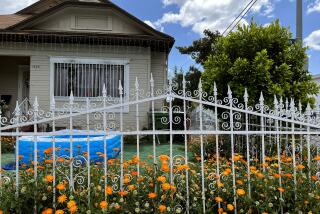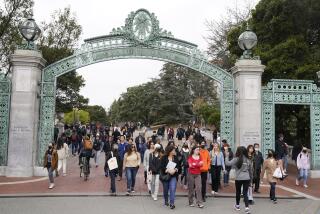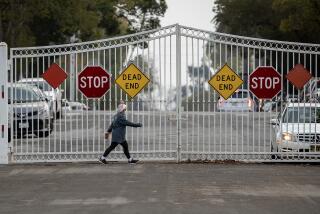Whatâs Lost Within the Safety of Gates
The decision to install security gates was a no-brainer for our middle-class community. But what message is this sending to our children?
When the idea was first proposed at the homeowners association meeting, everyone thought it was terrific. Electronic gates at the two entrances to our tract; why not? Certainly more security for our homes, lives and property was a good thing. Why should we allow people around our homes who had no business being there? The only concern some homeowners raised was about the cost. As it turned out, the association had a surplus of funds, more than sufficient to cover the costs. There was no reason not submit the proposal to a vote of all the homeowners.
The gates were presented as a win-win situation. First, the possibility of a bump in property values from becoming a gated community was dangled before us. The security issue, however, was the central point. Crime is on everyoneâs mind these days. Anything that makes access for potential troublemakers more difficult is an easy sell, especially if it involves no extra cost. The proposal to erect the gates passed on the first vote.
Our housing tract is not what could be called opulent or even upper-middle class. The median price of the 104 homes, built over the last three years, is under $200,000 and below the average for our area. Many of the residents are first-time buyers with young children. We are a mixed group, probably more Anglo than anything else, but with significant numbers of Asians, blacks and Latinos. We donât have luxury cars, valuable antiques or extensive collections of original art. As far as I know, we have no high-profile celebrities in residence. We have little in common with the gated communities in Hidden Hills or Bel-Air.
But, as the gates went up in early August, I couldnât help but wonder what message we would be sending, particularly to our children, by erecting these barriers. To me, the message is clear: The world outside is a dangerous place, full of undesirable types who will cause trouble for us unless we keep them at bay. Of course, we canât avoid leaving the safety behind the gates to go to school, work, shopping. Will our children pass through the iron fence with a sense of enthusiasm about life and its possibilities, or with the feeling that they are entering the âdanger zoneâ? Mobility and access to friendsâ houses was a big part of our lives when I was growing up in Orange County in the 1960s. We roamed the neighborhood on bikes, stopping in at various homes to see who was available to play. As we got older and began to drive, we would cruise the homes of girls we knew, hoping to get a look and maybe start up a conversation. At night, we would sometimes express our interest by toilet-papering their homes.
No boys will be cruising my house to see if my daughters are outside. None of their friends will drop in for a visit unless they buzz us first and request permission to enter. No one will toilet paper our house at 3 a.m. There will be no surprise visits from grandparents, cousins or anyone other than the families in our half of the housing tract.
I must admit that I sleep a little better at night, knowing there is an extra measure of protection between my home and those who would take my property and harm my family. I just wonder if the effect on our children, growing up behind locked gates, will be worth the perceived benefits.


